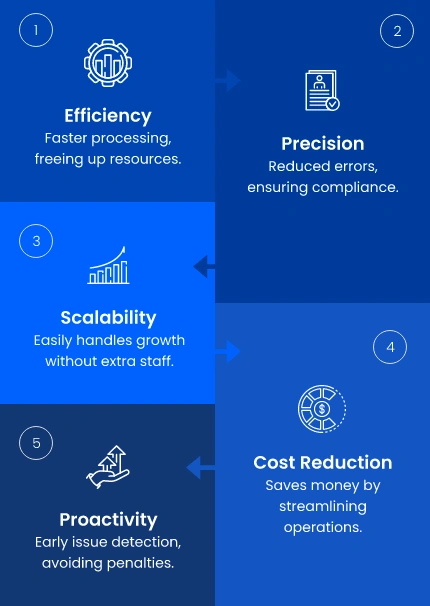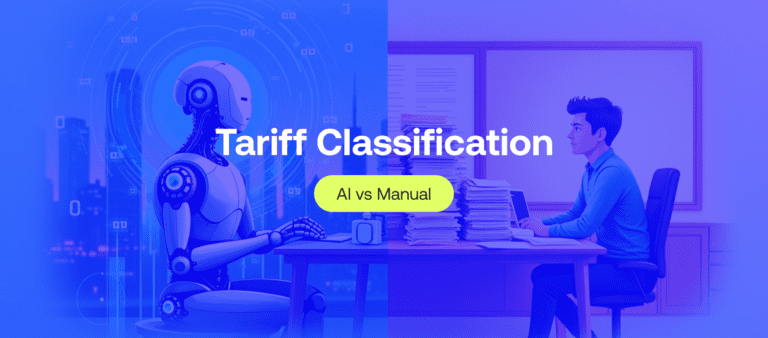Fast & Accurate ENS GB & EU ICS2 Solutions Built for You.
Automating Trade Compliance Checks with AI and Machine Learning
-
Freya Jane
- Director of Customer's Success
Entering the realm of international trade has a number of hurdles, particularly in terms of adhering to all of the laws. Businesses must manage a plethora of paperwork and intricate rules, which may be extremely difficult. However, there is some good news: Artificial intelligence and machine learning can assist. These advanced technologies can reduce errors, automate tedious jobs, and even assist in problem predictions.
According to a study, “65% of businesses are turning their heads towards adopting machine learning and AI because of its potential to help businesses in decision-making.”
This blog will examine how IDP, AI and machine learning might help businesses globally comply with trade regulations more easily and effectively.
The problem: Manual trade compliance checks
Conventional trade compliance techniques, which involve a laborious manual document review process, have a number of intrinsic drawbacks that make them impractical for businesses operating in the current global marketplace. Below, we will examine these restrictions in a simple way:
1. Time-consuming and labour-intensive: Processing a large number of trade documents by hand takes time and resources. This may impede operational efficiency and cause delays in critical trading operations.
2. Human error susceptibility: Even the most diligent personnel might make mistakes due to exhaustion or forgetfulness, which could result in errors and inconsistencies in the compliance procedure. These mistakes may lead to fines, delays, or other serious consequences.
3. Difficulty scaling with growth: As businesses grow internationally, a greater number of trade documents will inevitably be generated, making manual processing increasingly unmanageable. This may impede development and operational capabilities, and more staff may need to be hired and large investments made.
4. Challenges with complex rules: The trade compliance landscape is always changing, and with it, the complexity of rules. Maintaining them manually is quite difficult and requires constant training and dedication. This sensitivity to noncompliance might jeopardise smooth trade operations and result in significant expenditures.
These drawbacks show that innovative methods are required to improve trade compliance’s scalability, accuracy, and efficiency. Today, artificial intelligence and machine learning automation provide a potent and revolutionary solution to these problems.
The Solution: AI and machine learning to the rescue
The constraints of human trade checks for compliance give rise to the strong solutions of Artificial Intelligence (AI) and Machine Learning (ML) to revolutionise and streamline the process. These technologies provide a wide range of functions that may automate different trade compliance tasks, improving accuracy and efficiency to a great extent.
Document classification
AI and ML can automatically classify trade documents based on their content. This involves determining the document type (such as an invoice, licence, or permission) by looking at the general structure and keywords. This greatly speeds up processing times and lowers the requirement for human intervention by doing away with the necessity for manual sorting and routing.
iClassification, a potent AI-powered technology from iCustoms, integrates effortlessly with your current systems to automate customs data extraction and document classification, laying the groundwork for accurate and fast trade compliance.
Machine learning document processing
ML systems can be trained to extract important information from trade papers. This contains specifics like the declared values, the origin of the items, and product descriptions. Machine learning removes the need for labour-intensive and error-prone human data entry by automating data extraction. This increases the accuracy of the data and makes processing and analysis quicker.
Document intelligence
Once information is collected from documents, AI advances beyond classification. To find any compliance issues, it may analyse the data using complex algorithms. This involves pointing out discrepancies, inconsistencies, and potential regulatory violations. By proactively finding risks, businesses can deal with them early on, avoiding the expensive delays and fines that come with not following the rules.
By utilising iCustoms’ intelligent document processing platform (iDP), artificial intelligence (AI) examines extracted data to detect any compliance concerns, proactively protecting your business from expensive fines and delays.
AI-powered decision making
ML algorithms can use past data and laws to make informed decisions on approvals and risk assessments. Compared to manual approaches, these algorithms can detect patterns and anticipate possible problems more accurately by learning from past experiences. This simplifies review and approval procedures, eliminating human participation and assuring consistent decision-making based on rules.
AI and ML can completely change trade compliance by letting businesses simplify tasks, gain valuable insights, and improve accuracy. These improvements bring about a new age of efficiency, making it easier for businesses to handle the complicated world of trade compliance.
Benefits of Automating Trade Compliance with AI and ML

Using AI and ML to automate trade compliance checks opens a slew of benefits that may significantly improve your business operations. Here’s how:
1. Unleash unmatched efficiency
Consider considerably shorter processing times and quicker turnarounds for trade compliance checks. This results in a more efficient process, freeing up important human resources to concentrate on other important business tasks. Bid farewell to laborious manual labour and welcome to a more seamless and effective trade compliance process.
2. Attain flawless precision
Human error is a constant problem in manual compliance checks. Utilising ML and AI, you can greatly reduce this risk. By ensuring exact and constant adherence to laws, these intelligent technologies remove the chance of costly mistakes and non-compliance problems.
3. Take on effortless scalability
As your business grows internationally and trade volumes rise, handling compliance chores by hand becomes a daunting challenge. AI and ML provide the secret to seamless scaling. These solutions can easily manage increasing workloads, removing the need for more staff and guaranteeing that your compliance procedures stay up with your business’s objectives for growth.
4. Reduce operating costs
Processing trade compliance manually might have a substantial financial cost. Automating this procedure with AI and ML can result in significant cost reductions. AI and ML may greatly boost your bottom line by lowering the need for human resources, lowering the possibility of fines for non-compliance, and simplifying overall operations.
5. Proactive compliance
AI and ML make proactive risk detection possible. By analysing data and identifying any compliance issues early on, these intelligent technologies enable you to take prompt remedial action. This proactive strategy reduces the possibility of fines and delays.
Embark on your AI and ML journey for Trade Compliance with iCustoms
We at iCustoms are aware of the challenges that businesses face when attempting to comply with intricate trade laws. For this reason, we provide a strong AI and ML-powered solution that will automate your trade compliance checks, optimise workflows, and guarantee accuracy.
Here’s how you can start using iCustoms’ AI and ML solutions for trade compliance:
1. Determine your unique compliance requirements:
Do you struggle with manual document processing, product classification, or regulatory updates? Understanding your particular needs will enable us to customise our offerings to your business.
Analyse your existing trade compliance processes to see where automation might help you the most.
2. Partner with iCustoms:
Our team of specialists will collaborate closely with you to comprehend your unique requirements and suggest the best platform and AI/ML solutions from the iCustoms collection.
We provide a range of automated solutions that help you comply with international trade rules and regulations.
4. Easy integration with existing workflows:
We understand how critical it is to minimise interference with your current business operations.
Our automated solutions are made to function in harmony with your current workflows, requiring the least amount of adjustment and optimising productivity.
5. Monitor and optimise for ongoing improvement
iCustoms offers dashboards and tools for tracking the effectiveness of your artificial intelligence and machine learning systems. You may continually optimise your system for even higher accuracy and compliance by analysing insights and data.
Takeaway
Using AI and machine learning in trade compliance operations has revolutionary potential for businesses looking to improve efficiency and scalability. These innovative technologies may provide businesses with the confidence and agility to handle the challenges of international trade, giving them a competitive advantage in the global market.
Ready to unleash AI and ML’s revolutionary potential for your trade compliance? With its extensive array of AI and ML-powered products, iCustoms can help you increase productivity, reduce risk, and seize new business possibilities. Contact iCustoms right now to find out how our expertise can help your business prosper in the dynamic trade industry and make customs clearance a breeze.
FAQ's
How does Machine Learning enhance trade compliance checks?
Machine learning streamlines trade compliance checks by automating operations such as document categorisation and data extraction, resulting in faster and more accurate assessments.
What benefits do AI and Machine Learning bring to trade compliance processes?
AI and machine learning help trade compliance procedures by boosting efficiency, decreasing errors, and allowing proactive risk identification, thus improving overall compliance effectiveness.
Can Machine Learning adapt to changing trade regulations for continuous compliance?
Yes, machine learning is able to adapt to changing trade rules by continually learning from new data and altering compliance models as needed, assuring continued compliance with evolving regulations.
How do AI and machine learning mitigate risks in trade compliance?
AI and machine learning reduce trade compliance risks by proactively identifying compliance concerns, minimising mistakes through automation, and offering insights for informed decision-making, lowering the chance of penalties and delays.
You may also like:
Struggling to Extract, Catagorise & Validate Your Documents?
Capture & Upload Data in Seconds with AI & Machine Learning
Subscribe to our Newsletter
About iCustoms
Struggling to Extract, Catagorise & Validate Your Documents?
Capture & Upload Data in Seconds with AI & Machine Learning

